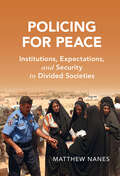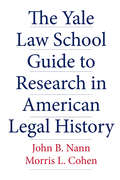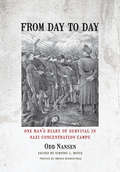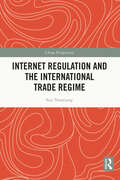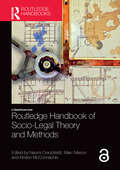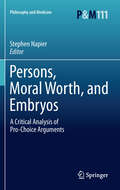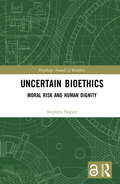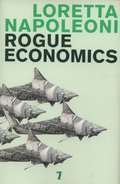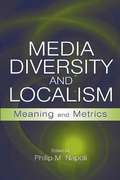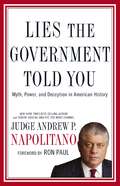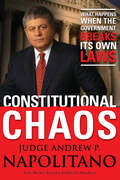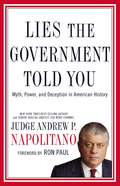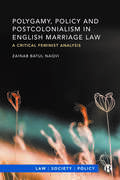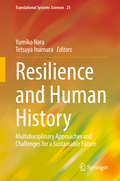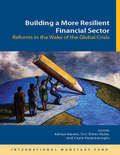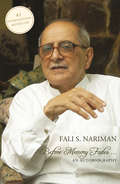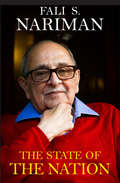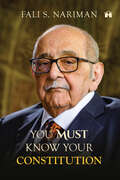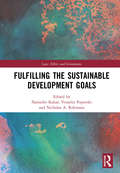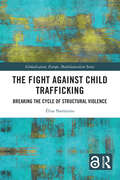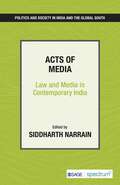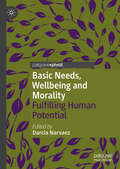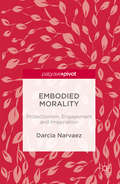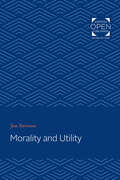- Table View
- List View
Policing for Peace: Institutions, Expectations, and Security in Divided Societies (Cambridge Studies in Law and Society)
by Matthew NanesIn communities plagued by conflict along ethnic, racial, and religious lines, how does the representation of previously-marginalized groups in the police affect crime and security? Drawing on new evidence from policing in Iraq and Israel, Policing for Peace shows that an inclusive police force provides better services and reduces conflict, but not in the ways we might assume. Including members of marginalized groups in the police improves civilians' expectations of how the police and government will treat them, both now and in the future. These expectations are enhanced when officers are organized into mixed rather than homogeneous patrols. Iraqis indicate feeling most secure when policed by mixed officers, even more secure than they feel when policed by members of their own group. In Israel, increases in police officer diversity are associated with lower crime victimization for both Arab and Jewish citizens. In many cases, inclusive policing benefits all citizens, not just those from marginalized groups.
The Yale Law School Guide to Research in American Legal History (Yale Law Library Series in Legal History and Reference)
by John B. Nann Morris L. CohenThe study of legal history has a broad application that extends well beyond the interests of legal historians. An attorney arguing a case today may need to cite cases that are decades or even centuries old, and historians studying political or cultural history often encounter legal issues that affect their main subjects. Both groups need to understand the laws and legal practices of past eras. This essential reference is intended for the many nonspecialists who need to enter this arcane and often tricky area of research.
From Day to Day: One Man's Diary of Survival in Nazi Concentration Camps
by Odd NansenThis new hardcover edition of Odd Nansen's diary, the first in over sixty-five years, contains extensive annotations and other material not found in any other hardcover or paperback versions. Nansen, a Norwegian, was arrested in 1942 by the Nazis, and spent the remainder of World War II in concentration camps--Grini in Oslo, Veidal above the Arctic Circle, and Sachsenhausen in Germany. For three and a half years, Nansen kept a secret diary on tissue-paper-thin pages later smuggled out by various means, including inside the prisoners' hollowed-out breadboards. Unlike writers of retrospective Holocaust memoirs, Nansen recorded the mundane and horrific details of camp life as they happened, "from day to day." With an unsparing eye, Nansen described the casual brutality and random terror that was the fate of a camp prisoner. His entries reveal his constantly frustrated hopes for an early end to the war, his longing for his wife and children, his horror at the especially barbaric treatment reserved for Jews, and his disgust at the anti-Semitism of some of his fellow Norwegians. Nansen often confronted his German jailors with unusual outspokenness and sometimes with a sense of humor and absurdity that was not appreciated by his captors. After the Putnam's edition received rave reviews in 1949, the book fell into obscurity. In 1956, in response to a poll about the "most undeservedly neglected" book of the preceding quarter-century, Carl Sandburg singled out From Day to Day, calling it "an epic narrative," which took "its place among the great affirmations of the power of the human spirit to rise above terror, torture, and death." Indeed, Nansen witnessed all the horrors of the camps, yet still saw hope for the future. He sought reconciliation with the German people, even donating the proceeds of the German edition of his book to German refugee relief work. Nansen was following in the footsteps of his father, Fridtjof, an Arctic explorer and humanitarian who was awarded the Nobel Peace Prize in 1922 for his work on behalf of World War I refugees. (Fridtjof also created the "Nansen passport" for stateless persons.) Forty sketches of camp life and death by Nansen, an architect and talented draftsman, provide a sense of immediacy and acute observation matched by the diary entries. The preface is written by Thomas Buergenthal, who was "Tommy," the ten-year-old survivor of the Auschwitz Death March, whom Nansen met at Sachsenhausen and saved using his extra food rations. Buergenthal, author of A Lucky Child, formerly served as a judge on the International Court of Justice at The Hague and is a recipient of the 2015 Elie Wiesel Award from the US Holocaust Memorial Museum.
From Day to Day: One Man's Diary of Survival in Nazi Concentration Camps
by Odd Nansen Timothy J. BoyceIn 1942 Norwegian Odd Nansen was arrested by the Nazis, and he spent the remainder of World War II in concentration camps—Grini in Oslo, Veidal above the Arctic Circle, and Sachsenhausen in Germany. For three and a half years, Nansen kept a secret diary on tissue-paper-thin pages later smuggled out by various means, including inside the prisoners' hollowed-out breadboards.Unlike writers of retrospective Holocaust memoirs, Nansen recorded the mundane and horrific details of camp life as they happened, "from day to day." With an unsparing eye, Nansen described the casual brutality and random terror that was the fate of a camp prisoner. His entries reveal his constantly frustrated hopes for an early end to the war, his longing for his wife and children, his horror at the especially barbaric treatment reserved for Jews, and his disgust at the anti-Semitism of some of his fellow Norwegians. Nansen often confronted his German jailors with unusual outspokenness and sometimes with a sense of humor and absurdity that was not appreciated by his captors.After the Putnam's edition received rave reviews in 1949, the book fell into obscurity. In 1956, in response to a poll about the "most undeservedly neglected" book of the preceding quarter-century, Carl Sandburg singled out From Day to Day, calling it "an epic narrative," which took "its place among the great affirmations of the power of the human spirit to rise above terror, torture, and death." Indeed, Nansen witnessed all the horrors of the camps, yet still saw hope for the future. He sought reconciliation with the German people, even donating the proceeds of the German edition of his book to German refugee relief work. Nansen was following in the footsteps of his father, Fridtjof, an Arctic explorer and humanitarian who was awarded the Nobel Peace Prize in 1922 for his work on behalf of World War I refugees. (Fridtjof also created the "Nansen passport" for stateless persons.)This new edition, the first in over sixty-five years, contains extensive annotations and new diary selections never before translated into English. Forty sketches of camp life and death by Nansen, an architect and talented draftsman, provide a sense of immediacy and acute observation matched by the diary entries. The preface is written by Thomas Buergenthal, who was "Tommy," the ten-year-old survivor of the Auschwitz Death March, whom Nansen met at Sachsenhausen and saved using his extra food rations. Buergenthal, who later served as a judge on the International Court of Justice at The Hague, is a recipient of the 2015 Elie Wiesel Award from the US Holocaust Memorial Museum.
Internet Regulation and the International Trade Regime (China Perspectives)
by Sun NanxiangIn the age of information, an open Internet is a key component for modern economic development. This book analyses the World Trade Organization Agreement for virtual society and explores key questions regarding internet regulation and trade barriers. Information and communication technology has introduced a transformational element to international trade, in the shape of E-commerce. Although internet technology is conceptually neutral, it can be used as a medium that poses severe threats to individual rights, public morals, public order, and national security. World Trade Organization law and jurisprudence, which are the basis of global economic and trade rules, can be applied in the cyberspace but internet regulatory measures can also pose a threat to free trade. This book thus explores the following questions: whether internet regulation constitutes a trade barrier; if so, what form does that take; and whether WTO members can invoke exception clauses to justify their internet regulatory measures? The research provides deep interpretations on treaty law, case law, and draws on additional interdisciplinary approaches to answer these questions. This book will be of great interest to students and scholars of law, with a focus on International trade and internet regulation, as well as anyone interested in China’s Cyber law.
Routledge Handbook of Socio-Legal Theory and Methods
by Naomi Creutzfeldt; Marc Mason; Kirsten McConnachieDrawing on a range of approaches from the social sciences and humanities, this handbook explores theoretical and empirical perspectives that address the articulation of law in society, and the social character of the rule of law. The vast field of socio-legal studies provides multiple lenses through which law can be considered. Rather than seeking to define the field of socio-legal studies, this book takes up the experiences of researchers within the field. First-hand accounts of socio-legal research projects allow the reader to engage with diverse theoretical and methodological approaches within this fluid interdisciplinary area. The book provides a rich resource for those interested in deepening their understanding of the variety of theories and methods available when law is studied in its broadest social context, as well as setting those within the history of the socio-legal movement. The chapters consider multiple disciplinary lenses – including feminism, anthropology and sociology – as well as a variety of methodologies, including: narrative, visual and spatial, psychological, economic and epidemiological approaches. Moreover, these are applied in a range of substantive contexts such as online hate speech, environmental law, biotechnology, research in post-conflict situations, race and LGBT+ lawyers. The handbook brings together younger contributors and some of the best-known names in the socio-legal field. It offers a fresh perspective on the past, present and future of sociolegal studies that will appeal to students and scholars with relevant interests in a range of subjects, including law, sociology and politics.
Persons, Moral Worth, and Embryos
by Stephen Napier"Bioethicists have achieved consensus on two ideas pertaining to beginning of life issues: (1) persons are those beings capable of higher-order cognition, or self-consciousness, and (2) it is impermissible to kill only persons. As a consequence, a consensus is reached regarding the permissibility of both destroying human embryos for research purposes and abortion. The present collection aims to interact critically with this consensus. Authors address various aspects of this 'orthodoxy'. Issues discussed include: theories of personhood and in particular the role of thought experiments used in support of such theories; the notion of an intrinsic potential and the moral relevance of having one; new formulations of the virtue argument against abortion rights; four-dimensionalism and abortion; the notion of moral status and who (or what) has it; scientific accounts of what a human being is, as well as addressing empirical evidence of fetal consciousness; and analysis of the public policy implications given the epistemic status of pro-choice arguments. Given the issues discussed and that the arguments in critical focus are fairly new, the collection provides a novel, comprehensive, and rigorous analysis of contemporary pro-choice arguments."
Uncertain Bioethics: Moral Risk and Human Dignity (Routledge Annals of Bioethics)
by Stephen NapierBioethics is a field of inquiry and as such is fundamentally an epistemic discipline. Knowing how we make moral judgments can bring into relief why certain arguments on various bioethical issues appear plausible to one side and obviously false to the other. Uncertain Bioethics makes a significant and distinctive contribution to the bioethics literature by culling the insights from contemporary moral psychology to highlight the epistemic pitfalls and distorting influences on our apprehension of value. Stephen Napier also incorporates research from epistemology addressing pragmatic encroachment and the significance of peer disagreement to justify what he refers to as epistemic diffidence when one is considering harming or killing human beings. Napier extends these developments to the traditional bioethical notion of dignity and argues that beliefs subject to epistemic diffidence should not be acted upon. He proceeds to apply this framework to traditional and developing issues in bioethics including abortion, stem cell research, euthanasia, decision-making for patients in a minimally conscious state, and risky research on competent human subjects.
Rogue Economics: Capitalism's New Reality
by Loretta NapoleoniThis is a report based on top-to-bottom primary-source interviews from banking executives in New York to Russian prostitutes to London morgue workers, and grounded in the author's personal experience in international finance.
Media Diversity and Localism: Meaning and Metrics (Routledge Communication Series)
by Philip M. NapoliQuestions concerning the quality of media performance and the effectiveness of media policymaking often revolve around the extent to which the media system fulfills the values inherent in diversity and localism principles. This edited volume addresses challenges and issues relating to diversity in local media markets from a media law and policy perspective. Editor Philip M. Napoli provides a conceptual and empirical framework for assessing the success/failure of media markets and media outlets in fulfilling diversity and localism objectives. Featuring well-known contributors from a variety of disciplines, including media, law, political science, and economics, Media Diversity and Localism explores the following topics:*media ownership and media diversity and localism;*conceptual and methodological issues in assessing media diversity and localism;*minorities, media, and diversity; and*contextualizing media diversity and localism: audience behavior and new technologies. This substantive and timely volume speaks to scholars and researchers in the areas of media law and policy, political science, and all others interested in media regulation. It can also be used in a graduate seminar on media policy topics.
Lies the Government Told You: Myth, Power, and Deception in American History
by Andrew NapolitanoYOU'VE BEEN LIED TO BY THE GOVERNMENTWe shrug off this fact as an unfortunate reality. America is the land of the free, after all. Does it really matter whether our politicians bend the truth here and there?When the truth is traded for lies, our freedoms are diminished and don't return.In Lies the Government Told You, Judge Andrew P. Napolitano reveals how America's freedom, as guaranteed by the U.S. Constitution, has been forfeited by a government more protective of its own power than its obligations to preserve our individual liberties."Judge Napolitano's tremendous knowledge of American law, history, and politics, as well as his passion for freedom, shines through in Lies the Government Told You, as he details how throughout American history, politicians and government officials have betrayed the ideals of personal liberty and limited government."--Congressman Ron Paul, M.D. (R-TX), from the Foreword
Constitutional Chaos: What Happens When the Government Breaks Its Own Laws
by Andrew P. NapolitanoIn this incisive and insightful book, Judge Andrew P. Napolitano peels back the legal veneer and shows how politicians, judges, prosecutors, and bureaucrats are trampling the U.S. Constitution in the name of law and order and fighting terrorism. Napolitano reveals how they:silence the First Amendmentshoot holes in the Secondbreak some laws to enforce othersentrap citizenssteal private propertyseize evidence without warrantimprison without chargekill without causePundits on the right, left, and center have praised Constitutional Chaos for its penetrating examination of our rights and liberties in the post-9/11 world."Has the war on terrorism taken away some of your rights? In a non-ideological way, Judge Andrew P. Napolitano answers that crucial question. This book will open your eyes."-Bill O'Reilly"This book is a wake-up call for all who value personal freedom and limited government."-Rush Limbaugh"In all of the American media, Judge Napolitano is the most persistent, uncompromising guardian of both the letter and the spirit of the Constitution. . ."-Nat HentoffJudge Andrew P. Napolitano is Fox News Channel's senior judicial analyst, seen by millions on The Big Story with John Gibson, The O'Reilly Factor, Fox and Friends, and other shows. Hisarticles and commentaries have been published in the Wall Street Journal, Los Angeles Times, St. Louis Post-Dispatch, Newark Star Ledger, and other national publications.
Lies the Government Told You: Myth, Power, and Deception in American History
by Andrew P. NapolitanoCenturies of government deception have suspended our freedom and replaced it with a mythology rich in the ideals we are promised but do not actually experience. The government's lies have become our country's heritage, passed down generationally and accepted over time as status quo. We allow our leaders to regulate, under false pretenses, every area of our supposedly free lives: What we eat, how our money is spent, how we protect ourselves. The basic tenets of living in a free society--the primacy of the individual and limited government-- are violated routinely and with little objection from those most affected. Judge Napolitano traces the deterioration of American freedom year by year, event by event, from the birth of the U.S. government to the economic and military crises of today. He illustrates how this distorted interpretation of government translates to loss for Americans--loss of life, loss of property, loss of freedom. The cost is staggering. Amid the bleak revelation is a call to action. Judge Napolitano offers a blueprint to salvage our freedom and restore the government to its intended role as an instrument to protect the freedoms of the people.
Polygamy, Policy and Postcolonialism in English Marriage Law: A Critical Feminist Analysis (Law, Society, Policy)
by Zainab NaqviSlaves, mistresses, concubines – the English courts have used these terms to describe polygamous wives in the past, but are they still seen this way today? Using a critical postcolonial feminist lens, this book provides a contextualized exploration of English legal responses to polygamy. Through the legacies of British imperialism, the book shows how attitudes to polygamy are shaped by indifference and hostility towards its participants. This goes beyond the law, as shown by the stories of women shared throughout the book negotiating their identities and relationships in the UK today. Through its analysis, the book demonstrates how polygamy and polygamous wives are subjected to imperialist and orientalist discourses which dehumanise them for practising a relationship that has existed for millennia.
Resilience and Human History: Multidisciplinary Approaches and Challenges for a Sustainable Future (Translational Systems Sciences #23)
by Yumiko Nara Tetsuya InamuraThis unique book provides a platform for resilience research, combining knowledge from various domains, such as genetics, primatology, archeology, geography, physical anthropology, cultural anthropology, medicine, ecology, psychology, risk management and systems science, in order to examine specific concepts. The term "resilience" was originally used in psychology, but in current-day usage, it mainly refers to the "ability to recover from disaster"; however, the concept of resilience is still ambiguous. This book challenges readers to reconsider the concept of resilience comprehensively from diverse perspectives and to re-conceptualize it as an important framework applicable in various research fields. The book explores resilience by expanding the time and space scales to the maximum. On the time axis, it traces back to our human ancestors (and even to anthropoid apes) and follows the evolution of humans, the origin of agriculture, the rise and fall of ancient civilizations, and the present day. On the space axis, it discusses levels ranging from genetic; bacterial flora; individual, indigenous communities; and modern societies; to the global level. As such it expands the base for considering the problems facing modern society and selecting a future direction. In the long history of evolution, we Homo sapiens have faced, and overcome, various kinds of risks. By acquiring resilience, we have surpassed other animals and become apparent rulers of the earth; but, at the same time, we are also facing more serious risks than ever before. This book provides insights into addressing the challenges of a sustainable future.
Building a More Resilient Financial Sector: Reforms in the Wake of the Global Crisis
by Aditya Narain Inci Ötker-Robe Ceyla PazarbasiogluThe IMF, with the Bank for International Settlements and the Financial Stability Board, has been at the forefront of discussions on reform of the global financial system to reduce the possibility of future crises, as well as to limit the consequences if they do occur. The policy choices are both urgent and challenging, and are complicated by the relationship between sovereign debt and risks to the banking sector. Building a More Resilient Financial Sector describes the key elements of the reform agenda, including tighter regulation and more effective supervision; greater transparency to strengthen market discipline and limit incentives for risk taking; coherent mechanisms for resolution of failed institutions; and effective safety nets to limit the impact on the financial system of institutions viewed as "too big to fail. " Finally, the book takes a look ahead at how the financial system is likely to be shaped by the efforts of policymakers and the private sector response.
Before Memory Fades: An Autobiography
by Fali S. NarimanBefore Memory Fades by Fali S. Nariman is a revelatory, comprehensive and perceptive autobiography – candid, compelling and authoritative.Internationally admired and respected, Fali S. Nariman is a senior advocate of the Supreme Court of India. He began his career at the Bombay High Court in November 1950, and has since been active in the legal profession. Over the years, he has held several prestigious posts at both the national and international levels. He became a Member of Parliament (Rajya Sabha) in November 1999. He is the recipient of the Padma Bhushan (1991) and the Padma Vibhushan (2007). Starting with his formative years, when he had the good fortune to interact with many eminent judges and advocates, Fali S. Nariman moves on to deal with a wide variety of important subjects, such as, the sanctity of the Indian Constitution and attempts to tamper with it. crucial cases that have made a decisive impact on the nation, especially on the interpretation of the law, the relationship between the political class and the judiciary, the cancer of corruption and how to combat this menace, the author outlines measures to restore the now-low credibility of the legal profession, he also delineates his role in several high-profile cases. In recognition of his track record, the Government of India nominated him to the Rajya Sabha. He describes the highlights of his tenure there. Both members of the legal profession and the lay reader will find the contents informative and useful.
The State of the Nation
by Fali S. NarimanA definitive, analytical and meticulous account of the present state of the nation – from a constitutional perspective – by one of India’s most respected legal luminaries An ardent defender of the Constitution of India, Fali Nariman has today attained the status of an outstanding lawyer who strongly believes in the rule of the law and stands by his convictions. In this timely volume, the author highlights crucial issues that the legislature, the executive, judiciary, the bar and the common people have to deal with virtually on a day-to-day basis. His main focus is on corruption at various levels and in ‘hallowed’ institutions, including the judiciary. The author contends that the legislative and executive wings of the government – the elected representatives of the people – were (and are) expected to provide for the welfare of the people. He points out that they have failed miserably simply because making of laws is not enough; applying and enforcing laws – which are also the primary duties of the government – have left much to be desired. Consequently, it is the judiciary that tells the government when and how to distribute excess food, what crops to grow and what not to grow, which economic projects are good for the country and which are not, and what fuel should be used in our vehicles and whether 2G/3G licences should be allotted only through auctions! The judiciary is hence accused of overreach! The contents also throw light on other important subjects such as: the implications of reservations for certain sections of the population (including minorities); the true purpose and significance of the Constitution; Centre–State relations; and whether the Constitution has benefited the common people over the years. This is a book that is absorbing as well as thought-provoking that will make the readers put on their thinking caps.
You Must Know Your Constitution
by Fali S. Nariman26 November 1949 marks the date when the longest constitution in the world was formally adopted to guide the largest democracy in the world. It effectively transformed the British Dominion of India into one nation—the independent Republic of India. The supreme law of the land set forth the workings of Indian democracy and polity, and its provisions aimed to secure justice, liberty, equality, and fraternity for the people of India. As drafted and as conceived, the constitution makes provision for a functioning democracy and not an electoral autocracy, and this is how it has to be worked. It is therefore imperative for all citizens to familiarise themselves with its provisions.In this definitive tome, the author (who commenced his legal practice in the year the constitution was enacted) presents his comments in a style that is comprehensive, lucid, and systematic. The book traces the history and the origins of India&’s document of governance and explains its provisions. Some of the salient features of the book include:• An educative and informative exposition of the different parts of the Indian Constitution, including a bird&’s-eye view of—and with comments on—all the three hundred and ninety-five articles of the constitution and additions made by constitutional amendments.• Provides references of critical cases and prominent constitutional developments up to 31 July 2023.• Insightfully describes the structure, powers, and directive principles of government institutions.• Contains updated judicial pronouncements and legislative and constitutional amendments.In essence, You Must Know Your Constitution is an immensely readable and insightful compendium, inter alia, for judiciary aspirants, academicians, legal and administrative authorities, policymakers, research scholars, and students as well as for general readers who are interested in exploring the manifold facets of India&’s core document of governance.
Fulfilling the Sustainable Development Goals: On a Quest for a Sustainable World (Law, Ethics and Governance)
by Narinder Kakar, Vesselin Popovski and Nicolas A. RobinsonThis book contains assessment of the progress, or the lack of it, in implementing the UN Sustainable Development Goals (SDGs). Through review of the assessments and of case studies, readers can draw lessons from the actions that could work to positively address the goals. The 2030 Agenda for Sustainable Development is designed to catalyze action in critical areas of importance to humanity and the planet. The effort to implement the SDGs, however, demands a sense of urgency in the face of environmental degradation, climate change, emerging conflicts, and growing inequality, among a number of other socio-economic problems. Five years after the launch of the 2030 Agenda, this book takes stock of how far the world has come and how we can position ourselves to achieve the global targets. The book is one of the first to assess how the implementation is impeded by the onset of COVID-19. It contains a special chapter on COVID-19 and the SDGs, while many thematic chapters on different SDGs also assess how COVID-19 adversely affects implementation, and what measures could be taken to minimize the adverse effects. This publication thus provides a fresh look at implementation of the SDGs highlighting impactful and creative actions that go beyond the business-as-usual development efforts. The volume reinforces this analysis with expert recommendations on how to support implementation efforts and achieve the SDGs through international and national strategies and the involvement of both the public and private sectors. The result is an indispensable textual tool for policy makers, academia, intergovernmental organizations (IGOs) and non-governmental organizations (NGOs), as well as the public, as we march toward the 2030 deadline.
The Fight Against Child Trafficking: Breaking the Cycle of Structural Violence (Globalisation, Europe, and Multilateralism)
by Élisa NarminioThis book analyses the contemporary effects of anti-trafficking policies on children trafficked for labour. It explores different dimensions of private and public apparatuses through which the governmentality of child trafficking manifests itself at a regional and interregional level. It investigates questions linked to the diffusion of the child trafficking norm between and within regions and stakeholders; to the criminalisation and vulnerabilisation of child traffickees; and to private governance of anti-trafficking initiatives, in particular concerning social sustainability of business supply chains. Drawing on extensive fieldwork with government, police, justice, civil society, multilateral organizations and businesses in the EU and in the ASEAN, the book argues that child traffickees are subjected not only to physical and psychological violence, but also to structural violence. The book concludes with suggestions to improve current anti-trafficking regimes. This book will be of key interest to scholars, students and practitioners in EU Studies, Southeast Asian Studies, Regionalism, Human Rights, Law, International Relations, and International Political Economy.
Acts of Media: Law and Media in Contemporary India
by Siddharth NarrainActs of Media seeks to consolidate a field of multidisciplinary work around media technologies that intersects with legal scholarship. This volume brings together contributions from leading academics, lawyers, researchers and policy experts about contemporary India and Sri Lanka. The approaches to law and media taken in this volume challenge us to think outside of traditional disciplinary descriptions. Rather than approaching the law as being outside of, and constantly catching up with the media, the contributors of this book view law and media as being deeply intertwined. The chapters in this volume address the relationship between law and media through different entry points---disputes over media and information systems shaping law, theories of law that incorporate media forms, and law and media co-producing trials. The multidisciplinary nature of this book has facilitated a rich and productive conversation among legal scholars, researchers and lawyers from disciplines such as constitutional law, law and technology, media and cinema studies, legal anthropology and political science.
Basic Needs, Wellbeing and Morality: Fulfilling Human Potential
by Darcia NarvaezBasic needs fulfilment is fundamental to becoming human and reaching one’s potential. Extending the BUCET list proposed by Susan Fiske - which includes belonging, understanding, control/competence, autonomy, self-enhancement, trust, purpose and life satisfaction - this book demonstrates that the fulfilment of basic needs predicts adult physical and mental health, as well as sociality and morality. The authors suggest that meeting basic needs in childhood vitally shapes one’s trajectory for self-actualization, and that initiatives aimed at human wellbeing should include a greater emphasis on early childhood experience. Through contemporaneous and retrospective research in childhood, the authors argue that basic need-fulfilment is key to the development of the self and the possibility of reaching one’s full potential. This book will be of interest to scholars of human wellbeing and societal flourishing, as well as to health workers and educators.
Embodied Morality
by Darcia NarvaezIn this book the broad, interdisciplinary theory of Triune Ethics Meta-theory is explored to demonstrate how it explains the different patterns of morality seen in the world today. It describes how human morality develops dynamically from experience in early life and it proposes that the methods in which humans are raised bring about tendencies towards self-protective or open-hearted social relations. When the life course follows evolutionary systems, then prosocial, open-hearted capacities develop but when the life course goes against evolutionary systems it should not be a surprise that self-focused values and behaviors develop such as violent tribalism, self aggrandizement and a binary orientation to others (dominance or submission). Many humans alive today exhibit impaired capacities in comparison to humans from small-band hunter-gatherer societies, the type of society that represents 99% of humanity's history. TEM is rooted in ethical naturalism and points out how to optimize human moral development through the lifespan--toward the ethics of engagement and communal imagination.
Morality and Utility
by Jan NarvesonOriginally published in 1967. In the past half-century, Utilitarianism has fallen out of favor among professional philosophers, except in such "amended" forms as "Ideal" and "Rule" Utilitarianism. Professor Narveson contends that amendments and qualifications are unnecessary and misguided, and that a careful interpretation and application of the original theory, as advocated by Bentham, the Mills, and Sidgwick, obviates any need for modification. Drawing on the analytical work of such influential recent thinkers as Stevenson, Toulmin, Hare, Nowell-Smith, and Baier, the author attempts to draw a more careful and detailed picture than has previously been offered of the logical status and workings of the Principle of Utility. He then turns to the traditional objections to the theory as developed by such respected thinkers as Ross, Frankena, Hart, and Rawls and attempts to show how Utilitarianism can account for our undoubted obligations in the areas of punishment, promising, distributive justice, and the other principal moral convictions of mankind. He contends that the Principle of Utility implies whatever is recognized to be clearly true in these convictions and that it leaves room to doubt whatever is doubtful in them. Narveson concludes with a rationally forceful proof of the Principle of Utility. In the course of this argument, which draws on the most widely accepted recent findings in analytical ethics, Narveson discovers an essential identity between the ethical outlooks of Kant and of Mill, which are traditionally held to be antithetical. Both thinkers, he shows, center on the principle that the interests of others are to be regarded as equal in value to one's own. A new view of Mill's celebrated "proof of utilitarianism" is developed in the course of the discussion.
